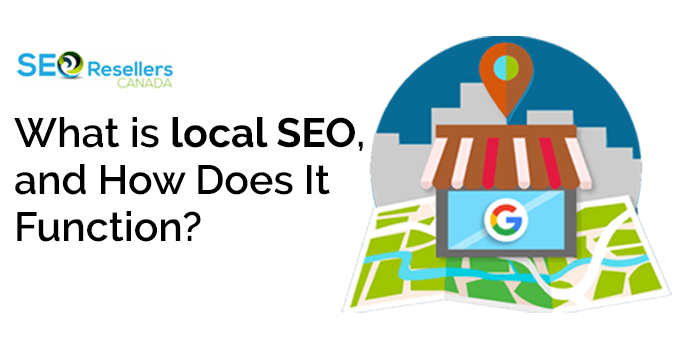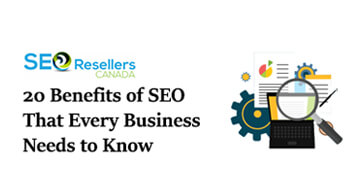Social media platforms have been around for more than a decade now. However, it is only in the last few years businesses have started using them for marketing purposes. Today, social networks have transformed how people search for information. But the question is, have these platforms replaced Google completely?
Well, the data shared by SEMrush states that Google gets more than 95 million total monthly visits, clearly stating its popularity worldwide. In fact, Google has remained in first place as a popular website for the past decade.
So, yes, even in 2024, you will have to take care of SEO to boost website rank. But wait; there is a twist. Artificial Intelligence (AI) dominates the cyber landscape today. It is significantly redefining the approach to SEO. If you believe that AI and SEO are merely speculations, you need to rethink. They are, in fact, an entwined reality that shapes the digital market. For instance, the use of ChatGPT is on the rise. But still, individuals question, “How will chatGPT affect SEO?”
To sustain in this futuristic panorama, you need to focus on AI SEO strategy. How? Keep reading to find out!
1- How is AI technology transforming industries?
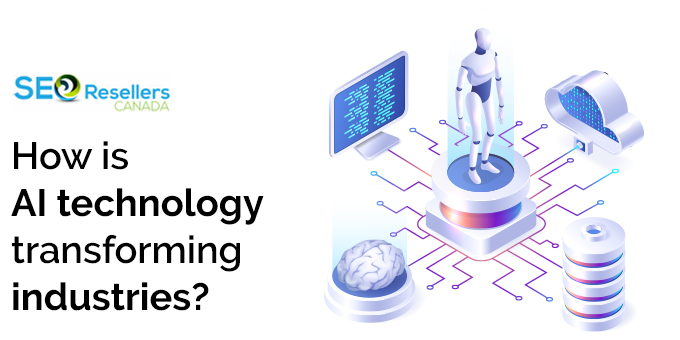
AI is making its mark across industries. It is revolutionizing workflows and boosting productivity.
- In healthcare, AI-driven diagnostic tools analyse scans swiftly, outpacing human capabilities and saving crucial time in critical situations.
- In manufacturing, AI-powered robots handle repetitive tasks, improving efficiency and minimizing the risk of workplace injuries.
- In advertising, AI algorithms craft targeted strategies based on customer behaviours, delivering personalized promotional messages.
- Retail sees a transformation with AI chatbots offering 24/7 instant customer service, whether online or in physical stores.
- Even in agriculture, AI-powered drone technology optimizes crop yield efficiently, providing a sustainable solution to food security challenges.
All these examples highlight AI’s boundary-breaking impact across diverse sectors.
2- Potential AI impact on SEO
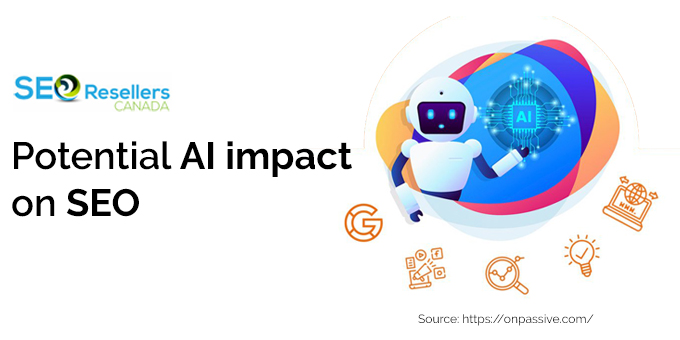
AI’s influence on SEO is profoundly transformative. Beyond refining search engine algorithms, artificial intelligence is revolutionizing keyword research, content creation, link building, and user experience—essentially every critical facet of SEO. Machine learning algorithms swiftly analyze data patterns, improving search results. This ushers in a new era, seamlessly blending AI-driven personalized SEO strategies with human creativity.
Now that we are in 2024, a significant impact of AI on SEO will revolve around semantic search. This means search engines will better understand natural language queries, grasping user intent and contextual meaning more effectively. This shift will elevate ‘relevant’ to a new level, making search engine responses ‘hyper-relevant.’
Moreover, the prominence of voice search will rise with the mainstream adoption of AI-driven smart home devices. This will fundamentally alter how keywords are selected, shifting from typed searches to spoken language patterns. In short, AI’s influence on SEO means working smarter, leading to enhanced website visibility and increased efficiency for marketers.
Now, let’s understand the many ways AI will impact each aspect of digital marketing and SEO –
2.1- Advanced keyword research using AI
Machine learning algorithms like Google’s RankBrain open up new possibilities for keyword analysis. Unlike traditional methods relying on historical data, Rank Brain uses artificial intelligence to grasp the context of search queries. This means optimizing keywords based on projected trends, semantic meanings, and user intent, making SEO efforts more predictive and adaptive.
Enhanced NLP application goes beyond simple word-by-word understanding and grasping complex language patterns, slang, and colloquialisms. This technological progress requires SEO professionals to factor in semantic search when developing content strategies.
Rank Brain, besides improving user intent understanding, excels in grasping subtle nuances in queries through machine learning. It evolves and becomes more intelligent over time by learning from past searches and emerging trends, a key element for a sophisticated SEO and content marketing strategy.
AI tools such as Moz Keyword Explorer and SEMrush Keyword Magic Tool are transforming keyword research. They use machine learning to offer long-tail keywords, topic suggestions, and detailed SERP analysis, providing insights into how specific phrases affect the search algorithm. This revolutionizes keyword research and greatly improves content creation strategies, aligning with the constantly changing behaviors of consumers.
AI is boosting on-page SEO optimization with tools like Surfer and Clear scope. They use AI to offer real-time content suggestions, aligning with user intent and enhancing content quality. These tools analyze top-ranking sites for specific keywords, identify patterns, and suggest edits like including LSI keywords, optimizing word count, or improving sentence structure.
Also, AI is simplifying link building through platforms like Buzz Stream Discovery and Link Research Tool’s Impact, automating prospecting for high-quality linking opportunities. AI filters opportunities based on metrics like keyword relevance and domain authority, significantly reducing manual time consumption and enhancing productivity.
In Technical SEO, AI tools like page speed insights use machine learning to identify potential improvements for site speed, while Botify offers actionable alerts on crawl ability issues using predictive analytics.
2.2- Content creation using AI technology
Using Natural Language Generation (NLG), a part of AI, in content creation strategies has radically changed SEO. NLG software swiftly produces high-quality content by generating human-like text from input data. The ability to create suitable, engaging content at scale is no longer just a futuristic concept but is increasingly becoming the standard in digital marketing.
NLG models provide:
- Customized solutions aligned with your SEO strategy.
- Creating search engine-friendly blog posts.
- Accurate meta descriptions.
- Dynamic product descriptions.
These machines utilize sophisticated algorithms to understand and mimic human language patterns, making keyword optimization while maintaining semantic relevance effortless and precise. Additionally, as ChatGPT and AI learn intuitively from interactions over time, it lays the foundation for SEO strategies that are not just automated but also adaptable and “smart.”
In this ongoing trend, AI-driven NLG produces diverse content portfolios rich in trending keywords and user-associated terminologies. These portfolios offer benefits across marketing aspects, enhancing conversion rates and boosting web traffic through improved search engine rankings. The contextual authenticity of these machine-generated write-ups is achieved through continuous training on extensive data types and specialized domains.
For businesses targeting multilingual audiences, NLG technologies offer automatic translation into various languages, preserving linguistic styles and dialects. Natural language processing ensures real-time grammatical checks for accurate messaging across platforms.
In the evolving landscape of SEO influenced by changing search engine algorithms and inventions like Google Project Magi, having AI systems continuously learn about new changes ensures ongoing relevance in your SEO strategy.
2.3- AI for effective link-building strategy
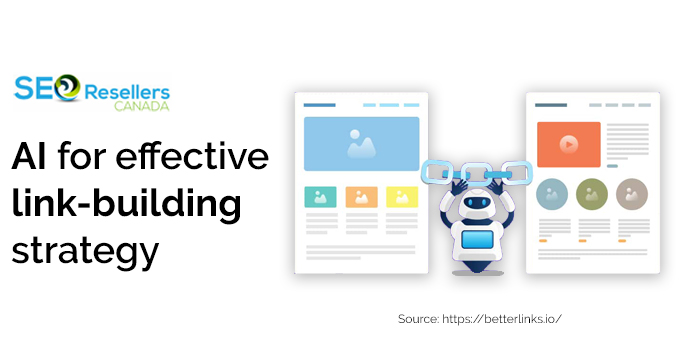
Looking ahead to the future of SEO, particularly in link building, AI-driven automation is not just a potential strategy; it’s becoming crucial for successful campaigns. AI can turn traditionally time-consuming tasks like link prospecting, outreach, and evaluation into efficient and impactful processes.
AI-powered tools revolutionize link-building by employing intelligent outreach methods. These advanced systems swiftly identify high-quality link opportunities from millions of websites and customize pitches with exceptional Personalization based on data-driven insights. This intuitive system not only continuously seeks prospects but also builds rapport through communications, resulting in not just quantity but quality backlinks. This marks a huge leap forward in making SEO efforts more productive and potent than ever before!
Modern systems in link building integrate robust analytics for expert assessment, efficiently determining relevance and authority. They prioritize strategic value over acquiring all links, with state-of-the-art automation expediting tasks and minimizing errors. Seamlessly integrated with content marketing and social media efforts, this approach fosters a holistic digital marketing ecosystem.
The fusion of link-building with other initiatives promotes creativity and innovation, focusing on a coordinated approach for boosting online visibility. Extending beyond SEO, it influences content curation and distribution, offering pervasive effectiveness in digital presence. These user-friendly tools cater to both beginners and experts, contributing significantly to the scalability of digital business operations.
2.4- Enhanced Personalization with AI
In 2024, AI-powered SEO strategies will emphasize personalized user experiences through machine learning algorithms. These algorithms will analyze user behaviour data, decoding complex datasets to understand individual preferences and habits. This level of Personalization, akin to having a favourite store tailored to each passerby, becomes an expected norm. With machine learning, personalized experiences involve monitoring and analyzing user behaviour and predicting future purchase trends based on buying history.
Conversational AI chatbots will become highly advanced in 2024. They will offer nearly indistinguishable interactions from real conversations. Besides, instantly addressing customer queries enhances the customer experience. Also, it provides valuable insights for retargeting and potential upselling, significantly improving conversion rates.
So, if you are wondering “how to improve organic search?” it is time you integrate AI with your SEO strategies to enhance Personalization and eventually get drilled into Google’s good books!
2.5- AI’s impact on voice search optimization
AI’s impact on voice search optimization is crucial for the future. Voice-enabled AI commands, like Hey Google or Hello Alexa, are revolutionizing internet inquiries, providing rapid and accurate results. Voice Search Optimization (VSO) is also evolving with AI-driven natural language processing. For instance, they are now making responses human-like and enhancing user comfort. Brands must adapt their SEO tactics to this shift from typed to spoken queries for optimized discovery.
The opportunities for brands are significant, with voice search becoming an essential aspect of the online experience. If the reports are to be believed, the global voice recognition market will witness a healthy growth of nearly 50 million U.S. dollars by 2029.
So, if you are ready to win in this market, start re-strategizing and integrating AI-driven solutions into your SEO efforts!
2.6- AI-powered analytics for measuring SEO success
AI-powered analytics tools enhance SEO strategies by providing accurate, comprehensive, and predictive insights. These tools operate 24/7, swiftly sifting through vast amounts of data to discern meaningful patterns and optimizing SEO strategy. Their predictive power anticipates future trends and behaviour based on historical data, allowing businesses to stay ahead of evolving search engine algorithms.
AI analytics not only adapts to current algorithmic trends but also anticipates future ones, facilitating strategic planning. It efficiently sifts through large data volumes, aiding Personalization efforts by utilizing customer behaviour patterns for unique user profiles and optimized engagement levels.
Measuring success, predicting user behaviour, and making real-time decisions become manageable with AI’s intelligent analysis capabilities. Deep learning allows continuous improvement in understanding customers’ wants and needs, providing a tactical edge in a competitive landscape.
3- What are some real-world success stories of AI SEO strategy?
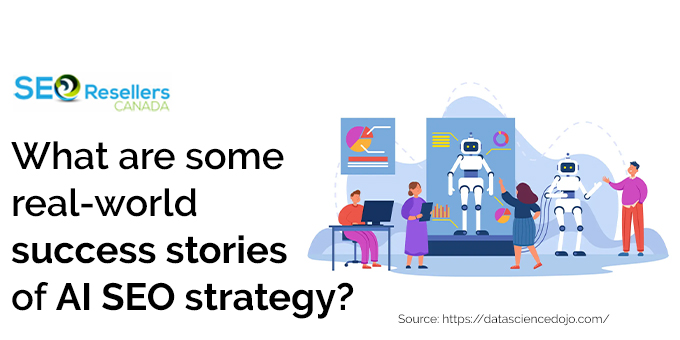
STACK Media, a content delivery website catering to athletes, saw a boost in business success tied to web traffic after integrating Bright Edge’s platform. Through this collaboration, they:
- Identified high-search-volume keywords relevant to the fitness category.
- Analyzed the SERP visibility of these keywords.
- Conducted competitive research to recognize content themes and structures of high-ranking page URLs.
Resulting from this partnership, STACK Media experienced a 61% increase in website visits, coupled with a significant 73% reduction in average bounce rate per page.
Rocky Brand, a footwear retail company, aimed to enhance organic search revenue by focusing on SEO-friendly content. To achieve this goal, they incorporated BrightEdge’s tools, including:
- Data Cube, which unveiled keywords crucial for driving organic traffic.
- BrightEdge Recommendations facilitates content optimization like page titles and meta tags.
- Storybuilder, assisting in tracking the impact of website optimization on brand equity and revenue.
- Keyword and Page Reporting is used to monitor keyword and content performance on pages.
Following the implementation of these SEO tools, Rocky Brand observed significant improvements. Also, they were able to find answers to their concerns, such as “how to use PPC and SEO together.”
- Search revenue increased by 30%,
- Year-over-year revenue soared by 74%,
- New users witnessed a notable rise of 13%.
4- Top must-invest AI SEO tools
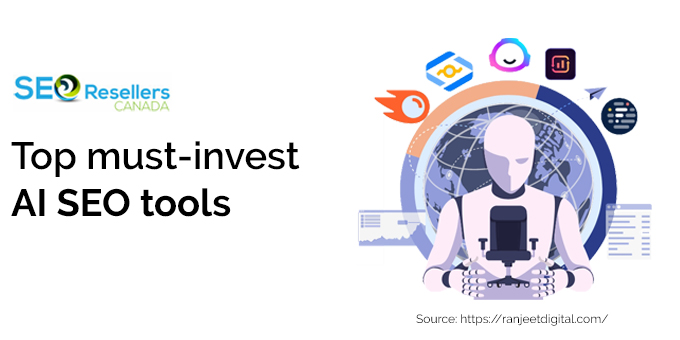
It is common to wonder, “Why are digital marketers so hyped for AI?”
Well, listed below are AI SEO tools and their ability to streamline your digital marketing and SEO efforts.
4.1- Surfer SEO
Surfer SEO employs AI to compare your website with top-performing competitors, offering optimizations to enhance your rankings.
4.2- Bright Edge
BrightEdge leverages AI to offer data-driven insights and recommendations, enhancing your website’s SEO strategy.
4.3- Frase
Frase utilizes AI to create content briefs, explore topics, and optimize existing content, enhancing overall SEO performance.
4.4- Market Muse
Market Muse utilizes AI to analyze the quality and relevance of your content, providing insights to assist you in creating more engaging content.
4.5- Clear scope
Utilizing artificial intelligence, this tool analyses the highest-ranking content and offers suggestions to enhance your own content.
5- On an ending note
The introduction of AI in the field of SEO is set to reshape our approach to online visibility by 2024. It can be confidently stated that AI-powered methods will go beyond boosting your content’s visibility. They will create tailored user experiences, organically nurturing customer relationships.
If you haven’t yet, it is important that you invest in AI-powered techniques proactively and implement the 5 digital marketing trends listed above. This is because it is a future-proof solution that dovetails perfectly with consumer expectations at every stage of their online interaction. Besides, it is crucial to embrace new technology’s bountiful offerings in order to stay ahead of the competition!
Now, here is an important question, “Are you ready to integrate AI SEO but worry you lack expertise and tools?” Seek SEO Resellers Canada assistance. They can guide you completely and even help you find answers for concerns like, How does ChatGPT affect SEO?” and more!












